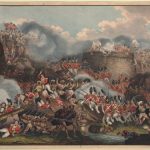FOUR BATTLES THAT CONDEMNED INDIA TO COLONIALISM
A ride through colonial history (Continued)
BATTLE OF ASSAYE 23 SEPTEMBER 1803
The Maratha Empire founded by Chatrapathi Shivaji during the 17th Century had expanded into the most powerful political entity in the subcontinent by mid 18th Century extending from Khyber in the Northwest to Tanjore in the South and Bengal in the East. Led by the Peshwa, the Prime Minister, based at Poona, the empire was ruled by a confederacy of regional warlords wielding semi-autonomous powers; namely the Holkars of Indore and Malwa, Gaikwars of Baroda, Scindias of Gwalior and Bhonsles of Nagpur. In 1761, it suffered a terrible setback when the Maratha Army lost the 3rd Battle of Panipat against Ahmed Shah Abdali of the Afghan Durrani Empire. Fissures appearing in the weakened confederacy after the debacle gave the British an opportunity to fish in troubled waters. The East India Company’s intervention in a succession struggle in Poona led to the 1st Maratha War (1775 – 1782), which it partially won employing its Bombay and Bengal troops. At the turn of the century, having established their supremacy over the South, the British turned on the Marathas again in the 2nd Maratha War (1803 – 1805), following the overthrow of their ally, the Peshwa.
Early in 1803, the British launched simultaneous offensives into the Deccan and Northern India. The Deccan offensive was undertaken by their Madras Army under Major General Arthur Wellesley (future Lord Wellington, the victor at Waterloo). After his initial campaigns at Poona and Ahmednagar, he came up against the combined armies of two of the confederate members, Scindia and Bhonsle, unexpectedly at the village of Assaye, some fifty miles northeast of Aurangabad in the afternoon of 23 September. The Marathas had a powerful force of over 30,000 in cavalry and infantry – mostly well-trained and led by European officers – with over 100 guns. Wellesley, with only 6000 men and 17 guns at that juncture attempted a risky flanking attack. The Marathas surprised him by deftly changing their front to face the attack squarely, leaving him with no option but a frontal assault. No other battle of the subcontinent during the colonial period would match the ferocity of the fight that followed. The two opposing lines plunged into each other in a deadly contest with no quarters given or asked. As the outcome of the battle hung in balance, the Madras Cavalry made a surprise charge from the flank breaking the Maratha line. The Maratha gunners still stood fast and the Madras Infantry had to charge right into their muzzles. Both sides took a terrible toll of casualties, Wellesley losing a third of his command; but at the end of day, he had a victory. The victory snatched from an enemy vastly superior in numbers, wherein ‘batteries were silenced by bayonets’ turned out to be a landmark achievement of his military career. When asked, towards the end of his days, to name the hottest battle of his career, his straight response was, ‘Assaye, without doubt’. That’s how great it was; a battle greater than that of Waterloo!
The victory at Assaye that the British earned more by providence (Wellesley had blundered into a situation wherein he found himself hanging by the skin of his teeth, rescued only by the timely arrival of his cavalry, much like the Prussian Cavalry would save the day for him 12 years later at Waterloo) broke the back of the Maratha Confederacy. The proud Marathas would indeed continue the fight and the war would last another two years; and the British would have to confront them in yet another conflict, the 3rd Maratha War (1817 – 1818) before they could finally overcome their challenge; but Assaye, in many ways, was the end of the road for the Marathas. Yet, had the outcome of the battle been different, there was always a chance we would have had an Indian (Maratha) Empire and not a British one. For that matter had the Confederacy remained united the British could never have made inroads into their affairs; the sad Indian narrative on the repeat again.
[To be continued. Next: BATTLE OF GUJRAT]





Highly informative and intriguing.